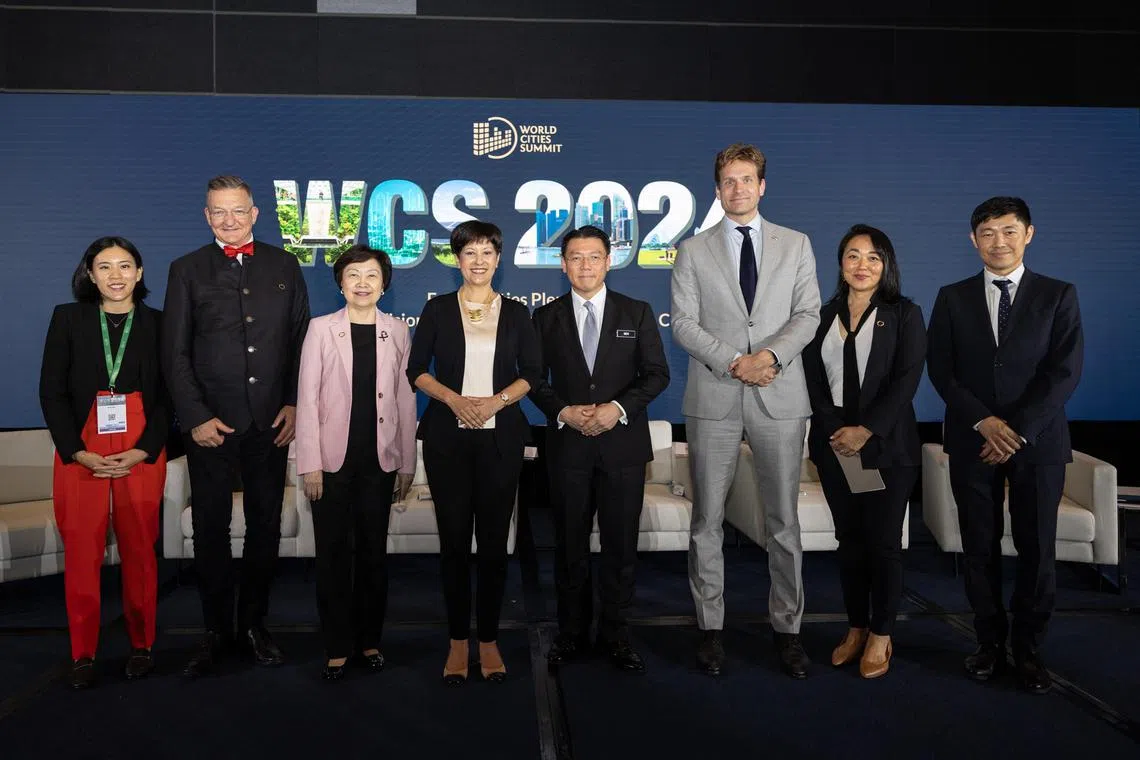Planners don’t know it all and need quality feedback to make cities better, say city leaders
Sign up now: Get ST's newsletters delivered to your inbox

Second Minister for National Development and Finance Indranee Rajah (fourth from left) with other city leaders ahead of the closing plenary of the World Cities Summit 2024.
PHOTO: WORLD CITIES SUMMIT 2024
SINGAPORE – Urban planners do not have a monopoly on ideas, and require quality inputs from citizens and the private sector, said city leaders at the World Cities Summit on June 4.
Speaking at a panel on partnerships between governments, businesses and people, Ms Edith Hsu-Chen, executive director of the New York City Department of City Planning, said: “We shouldn’t have the hubris to think that we know how to do it all, we know always what to do.”
She added that while urban planners are “great generalists” who can understand and process a lot of information, it is critical that they also listen to the societies they serve.
Citizens can help, she said, by offering meaningful inputs on plans.
“The last thing we want is a straight no. And maybe the second last thing we want is a straight yes,” she said at the closing plenary of the three-day summit, held at the Suntec Singapore Convention and Exhibition Centre.
“We actually would like to have suggestions because those suggestions, we can work with them, we can incorporate them. It will really improve our plans and our laws.”
Mr Cheng Hsing Yao, group chief executive of real estate developer GuocoLand, said that governments should be consistent and transparent in the implementation of policies, adding that policymakers do not work in a vacuum, and need to take in feedback from the private sector.
“It’s very important for the private sector to provide genuine feedback rather than provide inputs that are based on self-interest to lobby for what benefits themselves alone,” he said.
Noting that planning is inherently a political process – as plans affect multiple parties, each with its own objectives – Mr Cheng, a former Nominated MP, cautioned that public consultations should be focused on trade-offs, and not give undue attention to the “loudest voice”.
“It’s easy to levy the cost on others but just fight for one’s own agenda,” he said.
Conversations should instead be centred on trade-offs, he added, so that costs, and who bears them, are made clear.
While espousing the value of engagement, panellists acknowledged that there are challenges in bringing people to the discussion table, and hearing from all the parties.
Mr Vincent Karremans, vice-mayor of Rotterdam in the Netherlands, said that when it comes to decision-making for cities, “the politically correct answer should be everyone should decide, but that’s impossible”.
Ms Hsu-Chen added: “It is impossible to hear from everybody, but it is really important to try.”
Plans that draw on the inputs of a broad population are likely to be longer-lasting, she said.
Leaders at the summit also said that where consensus cannot be achieved, making the “right decision” is necessary.
At an earlier panel on planning for future cities, Mr Lungelo Mbandazayo, city manager of Cape Town in South Africa, said that one of the biggest challenges his city faces is rapid urbanisation, which has been necessary to accommodate migration from other provinces.
“We all talk about densification in order to accommodate migration, and everyone agrees, but not in my backyard,” he said, referring to citizens who refuse changes to their communities brought by urban development.
He added that there is nothing in Cape Town that gets people more up in arms than if you obstruct their views – “view of the Table Mountain and view of the sea”.
To get citizens’ buy-in, Malaysian Minister of Housing Nga Kor Ming, who spoke at the closing plenary, said leaders should provide “a clear vision” and have “transparent, consistent policies that people agree with” so that implementing policies will be easier.
He said that policymakers should be guided by humanity.
“As policymakers or as mayors, whatever decision we make, the first rule is that your conscience must be clear,” he said, adding that decisions should serve social justice.
Mr Karremans agreed, saying: “Never let a system win from the people.
“Your argument for turning down a case of opposition should never be ‘No, because that’s just our policy’. Never.
“Always be able to face it using humanity, and be very conscious about it.”
Referencing New York City’s ongoing efforts to update its zoning regulations, Ms Hsu-Chen said that it is imperative that planners and legislators cast away rules and laws that are inhumane.
Land-use zoning is “a book of values”, she said, adding that zoning “should reflect the city that we want”.
“We want it to be fair, more equitable, more prosperous, more green – we have to make sure our laws can deliver that kind of city,” she said.



